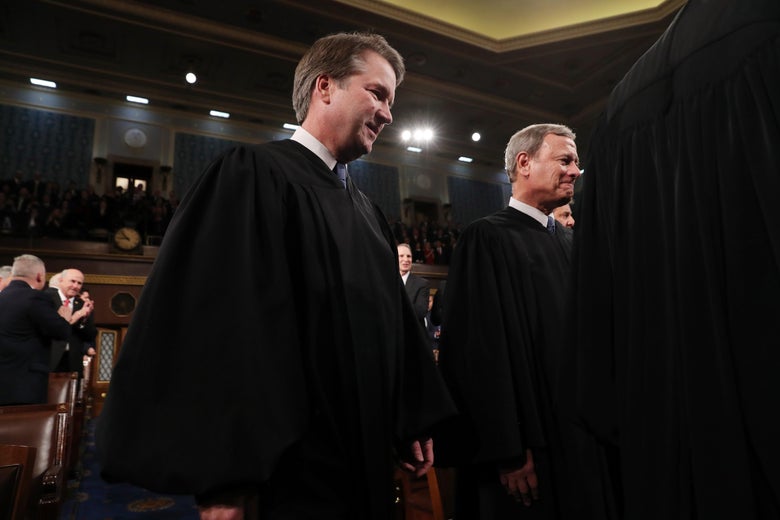
Supreme Court Justice Brett Kavanaugh and Chief Justice John Roberts arrive to hear President Donald Trump deliver the State of the Union address in the House chamber on February 4, 2020 in Washington, D.C.
Pool/Getty Images
Friday at midnight, the Supreme Court rejected a church’s challenge to California’s COVID-19 restrictions by a 5–4 vote, with Chief Justice John Roberts joining the liberals. In a pointed opinion, Roberts indicated that he will not join conservative judges’ escalating efforts to override public health measures in the name of religious freedom. Justice Brett Kavanaugh’s dissent, by contrast, falsely accused the state of religious discrimination in an extremely misleading dissent that omits the most important facts of the case. Roberts went out of his way to scold Kavanaugh’s dishonest vilification of the state.
SCOTUS’ late-night order in South Bay United Pentecostal Church v. Newsom divided the justices into two camps: those who acknowledge reality, and those who ignore it to score ideological points. The case began when a California church accused Gov. Gavin Newsom of violating its religious freedom. Newsom’s current COVID-19 policy limits attendance at houses of worship to 25 percent of building capacity or a maximum of 100 attendees, whichever is lower. At the same time, it allows certain secular businesses, like grocery stores, to operate under looser guidelines, allowing more people to enter. The church claimed this disparate treatment between churches and commercial establishments runs afoul of the First Amendment.
As Roberts noted, however, California does not impose uniform rules on all places where people assemble. The state does strictly limit church attendance. But it applies “similar or more severe restrictions” to “lectures, concerts, movie showings, spectator sports, and theatrical performances.” So the question for the court is less constitutional than scientific: From an epidemiological perspective, are churches more like grocery stores or concerts? And that, the chief justice concluded, is a question for lawmakers, not federal judges.
“The precise question of when restrictions on particular social activities should be lifted during the pandemic,” Roberts declared, “is a dynamic and fact-intensive matter subject to reasonable disagreement.” The Constitution leaves such decisions “to the politically accountable officials of the state,” whose decisions “should not be subject to second-guessing” by judges who lack “background, competence, and expertise to assess public health.” Multiple coronavirus outbreaks in California have been traced back to religious services. California has good reason to treat churches more like concerts—where people “congregate in large groups” and “remain in close proximity for extended periods”—than grocery stores, where they can social distance. For courts, that should be the end of the matter.
Kavanaugh, in dissent, viewed the case through a different lens. Whereas Roberts began by noting that COVID-19 has “killed thousands of people in California and more than 100,000 nationwide,” Kavanaugh crafted a narrative of invidious religious discrimination. His dissent reads like a brief by the church, not a judicial opinion. Kavanaugh alleged that Newsom’s order “indisputably discriminates against religion” in violation of the free exercise clause. For support, the justice insisted that “comparable secular businesses,” like grocery stores and pharmacies, “are not subject” to the same restrictions imposed on churches. California must have a “compelling justification” for this disparate treatment, and he saw none.
But Kavanaugh’s assertion that California treats churches and “comparable secular businesses” differently begs the question: what is a comparable secular business? When it comes to the spread of infectious disease, is a church really just like a grocery store, where people spend as little time as possible, separated by aisles and shopping carts, rarely speaking to one another? Or is it more like a concert, where people congregate for lengthy periods, shoulder to shoulder, often speaking or singing and thereby spreading droplets that may contain the coronavirus?
What is genuinely shocking about Kavanaugh’s dissent is that he does not even address this question. The dispute lies at the heart of the case, and Kavanaugh ignores it. He simply takes it as a given that churches are “comparable” to grocery stores when it comes to risk of spreading COVID-19. By warping the facts, Kavanaugh paints California’s rules as irrationally discriminatory, when in fact they are based on medical advice Newsom has right now. If the justice wants to override public health measures during a pandemic, shouldn’t he at least admit that he’s substituting his own scientific judgment for that of a democratically elected lawmaker’s?
Roberts seems to think so. His dissent ends with a clear swipe at Kavanaugh: “The notion that it is ‘indisputably clear’ that the Government’s limitations are unconstitutional,” the chief justice wrote, “seems quite improbable.” Roberts went out of his way to telegraph his displeasure with the raft of lawsuits contesting COVID-19 restrictions as unconstitutional burdens on religious liberty. Even in borderline cases, he suggested, courts must defer to the people’s representatives if they decide the health crisis requires limitations on public assemblies.
While all four far-right justices dissented from Friday’s order, only Justices Clarence Thomas and Neil Gorsuch joined Kavanaugh’s dissent. Justice Samuel Alito declined to join Kavanaugh’s opinion and did not explain why. It’s possible Alito was so perturbed by his colleague’s deceptive recitation of the facts that he could not sign in good faith. Meanwhile, though the four liberals joined Roberts in turning away the church’s challenge, the chief justice wrote only for himself. His opinion reads like an official statement from the head of the judicial branch, reminding lower courts not to overstep constitutional boundaries when assessing COVID-19 orders. As long as Roberts has anything to say about it, the Supreme Court will not facilitate the spread of a deadly virus in the name of the First Amendment.
Readers like you make our work possible. Help us continue to provide the reporting, commentary, and criticism you won’t find anywhere else.
Join Slate Plusfrom Slate Magazine https://ift.tt/3ch23ZC
via IFTTT
沒有留言:
張貼留言